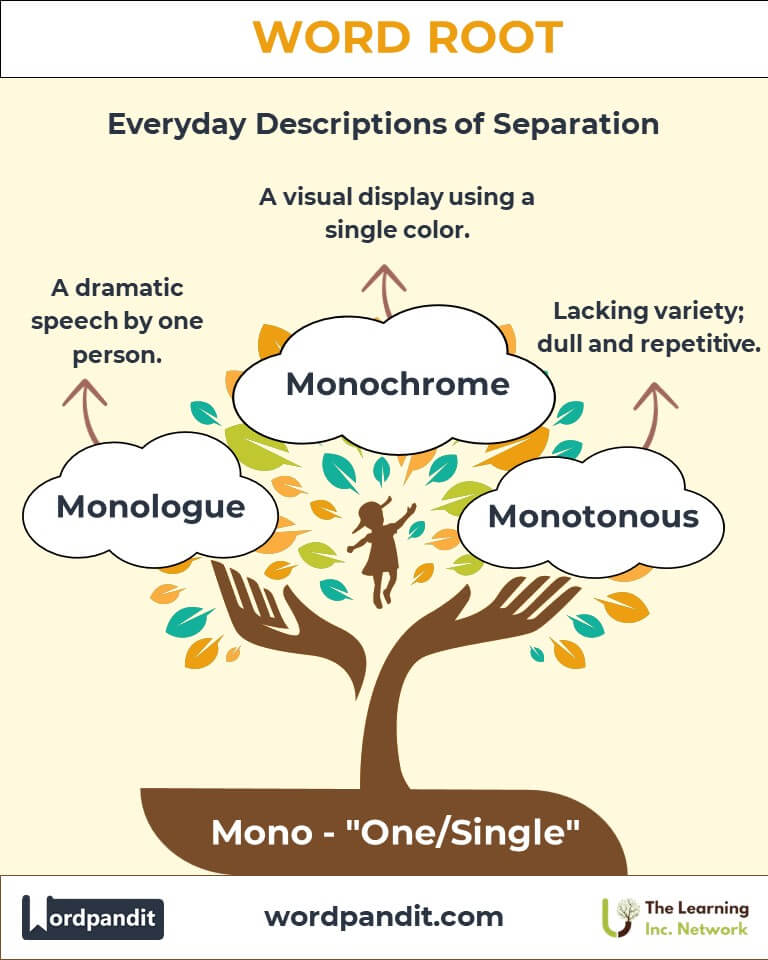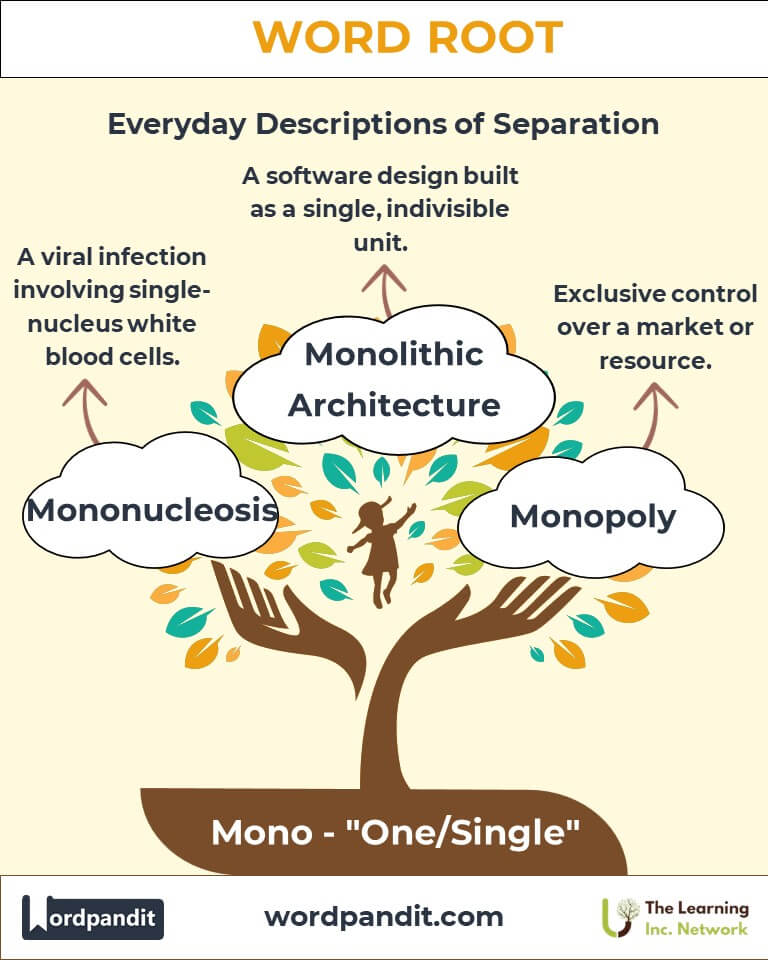Mono: The Power of "One" in Language, Science, and Culture
Discover the versatility and significance of the root "mono," derived from Greek, meaning "one" or "single." From the dramatic "monologue" to the economic "monopoly," this root forms the foundation of words that describe singularity, unity, and exclusivity.

Table of Contents
- Introduction: The Essence of Mono
- Etymology and Historical Journey
- Mnemonic: Unlocking the Power of Mono
- Common Mono-Related Terms
- Mono Through Time
- Mono in Specialized Fields
- Illustrative Story: Mono in Action
- Cultural Significance of the Mono Root
- The Mono Family Tree
- FAQs About the Mono Word Root
- Test Your Knowledge: Mono Mastery Quiz
- Conclusion: The Living Legacy of Mono
Introduction: The Essence of Mono
Have you ever listened to a monologue or observed a business with a monopoly? These words are united by the root "mono," pronounced "moh-noh," derived from the Greek word monos, meaning "one" or "single." Whether in storytelling, science, or technology, the "mono" root represents singularity, simplicity, and unity. This versatile root shapes a range of terms that connect disciplines and cultures.

Etymology and Historical Journey
The root "mono" originates from ancient Greek, where monos signified "alone" or "only." It appeared in classical texts to describe singular entities or states of being. As languages evolved, "mono" became a staple in Latin, eventually influencing modern English vocabulary. Over centuries, its usage expanded to fields as diverse as literature, biology, and economics, maintaining its core meaning of singularity.
Mnemonic: Unlocking the Power of Mono
Visualize this: A single spotlight shines on a lone performer delivering a monologue. The stage is bare, emphasizing their solitary presence.
Mnemonic Device:
"Mono = one spotlight, one star, one idea to shine!"
Common Mono-Related Terms
- Monologue (moh-noh-log):
Definition: A dramatic speech by a single character.
Example: "Her emotional monologue captivated the audience." - Monopoly (moh-nah-pol-ee):
Definition: Exclusive control over a market or resource.
Example: "The company faced scrutiny for maintaining a monopoly on the software industry." - Monochrome (moh-noh-krohm):
Definition: A visual display using one color or shades of a single color.
Example: "The artist’s monochrome painting evoked a sense of nostalgia." - Monotonous (moh-not-uh-nuhs):
Definition: Lacking variety; dull or repetitive.
Example: "The monotonous tone of the lecture made it hard to stay awake." - Monogamy (moh-noh-gah-mee):
Definition: The practice of being married to one person at a time.
Example: "Monogamy is a common tradition in many cultures." - Monolith (moh-noh-lith):
Definition: A large single block of stone; also used metaphorically to describe something massive and indivisible.
Example: "The ancient monolith stood as a testament to human ingenuity."
Mono Through Time
- Monastic: Derived from the solitary lives of monks, this term emphasizes simplicity and devotion.
- Monotype: Originally describing a printing process using single letters, it now extends to unique artistic works or organisms in biology.
Mono in Specialized Fields
- Medicine:
Mononucleosis: A viral infection characterized by an increase in single-nucleus white blood cells.
Relevance: Commonly known as the "kissing disease," it highlights how "mono" refers to a singular cell type. - Technology:
Monolithic Architecture: Refers to a software design built as a single, indivisible unit.
Application: While efficient in simpler systems, monolithic designs can hinder scalability. - Physics:
Monochromatic Light: Light consisting of a single wavelength.
Importance: Key in experiments requiring precision, such as spectroscopy. - Economics:
Monopoly: Central to discussions of market control and competition.
Impact: Examines the balance between innovation and fair trade.
Illustrative Story: Mono in Action
In a quiet town, an aspiring playwright named Mia dreamed of creating a one-person show. After weeks of preparation, she stood alone on stage under a single spotlight, delivering her monologue. The audience, initially skeptical of a "one-note" performance, was captivated by her ability to weave humor and tragedy seamlessly. By the end of the show, they realized the power of "mono"—one voice could indeed carry many emotions and ideas.
Cultural Significance of the Mono Root
The root "mono" reflects humanity's fascination with singularity. From ancient monoliths symbolizing divine presence to modern debates over monopolies in global markets, "mono" highlights the interplay between unity and diversity. It also underscores themes of individuality, as seen in monologues and personal narratives.

The Mono Family Tree
- Uni (Latin: one):
- Unilateral: Involving one side.
- Unique: One of a kind.
- Solo (Italian: alone):
- Solitary: Existing alone.
- Soliloquy: A character’s inner monologue in a play.

FAQs About the "Mono" Word Root
Q: What does "mono" mean?
A: "Mono" means "one" or "single," derived from the Greek root monos. It refers to concepts of singularity, unity, or being alone. This root appears in words that describe singular entities, such as monologue (a speech by one person) or monopoly (exclusive control by one party).
Q: Is "mono" always used to imply negativity?
A: No, while some terms like monotonous (boring or repetitive) have negative connotations, others, such as monumental (impressive and significant) or monochrome (artistic and striking), have positive or neutral meanings. The tone depends on the context of its usage.
Q: How is "mono" different from "uni"?
A: Both roots mean "one," but they are used in different contexts: Mono emphasizes singularity or exclusivity, as in monopoly (one controlling entity) or monologue (one person speaking). Uni often conveys unity or completeness, as in universe (a single, unified cosmos) or unilateral (affecting one side).
Q: What does "monologue" signify?
A: A monologue is a speech delivered by one person, typically in a play, movie, or other performance. It is often used to reveal a character's thoughts or feelings directly to the audience, showcasing the power of singular expression.
Q: What is mononucleosis?
A: Also called "mono" for short, mononucleosis is a viral infection caused by the Epstein-Barr virus. It is characterized by an increase in single-nucleus white blood cells and symptoms like fatigue, fever, and swollen glands. It’s commonly known as the "kissing disease" because it spreads through saliva.
Test Your Knowledge: Mono Mastery Quiz
1. What does the root "mono" mean?
2. Which term describes a single-color artwork?
3. What does "monotonous" mean?
4. What is a "monopoly"?
5. Which field uses "monochromatic light"?
Conclusion: The Living Legacy of Mono
The root "mono" continues to resonate across disciplines, symbolizing the power and challenge of singularity. From its Greek origins to its modern applications, it reflects humanity’s ability to find strength in unity and simplicity. Whether describing a solo performance or a single dominant force, "mono" remains a timeless reminder of the significance of one.














